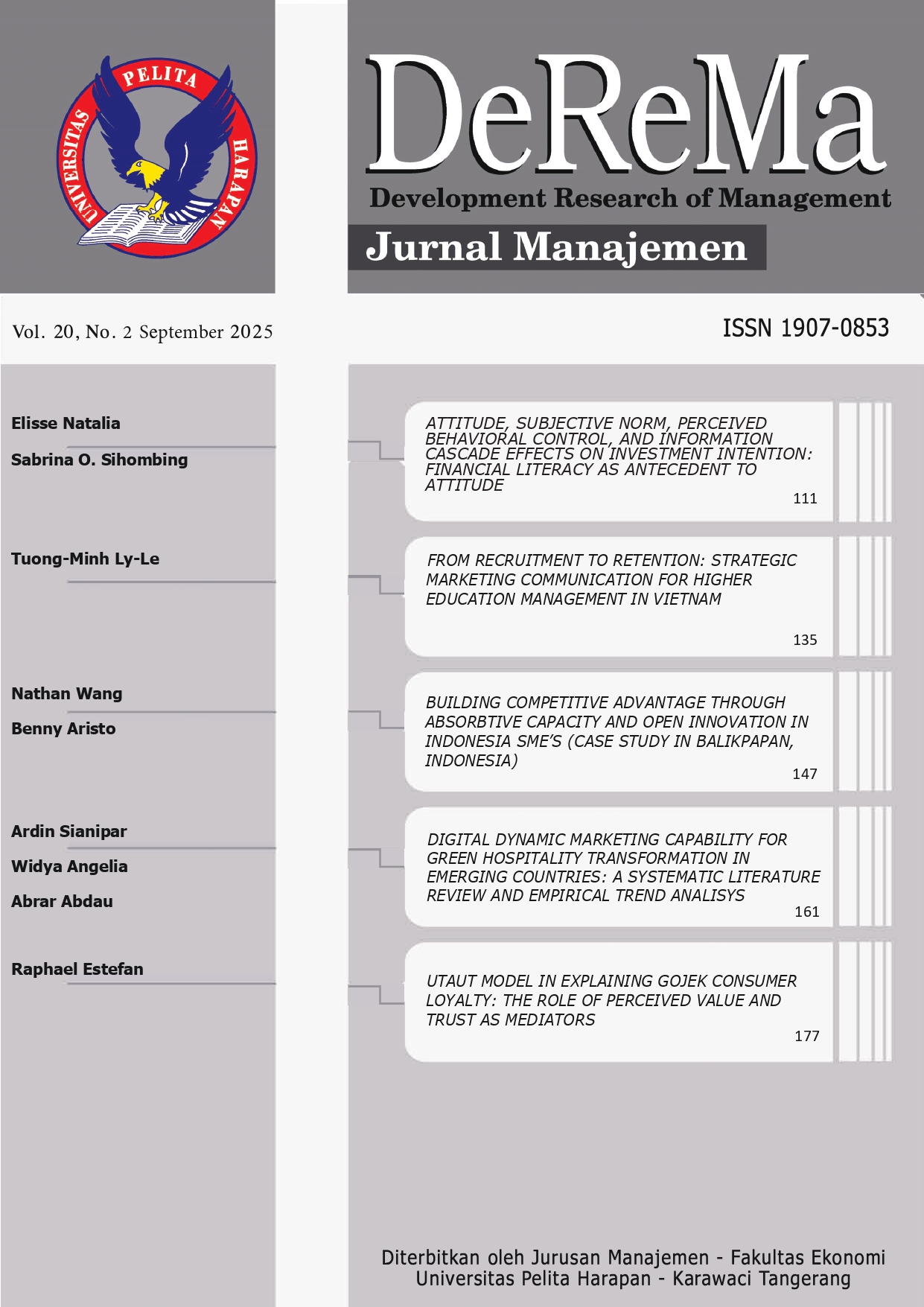UTAUT MODEL IN EXPLAINING GOJEK CONSUMER LOYALTY: THE ROLE OF PERCEIVED VALUE AND TRUST AS MEDIATORS
##semicolon##
https://doi.org/10.19166/derema.v20i2.10177##semicolon##
Perceived susceptibility##common.commaListSeparator## perceived severity##common.commaListSeparator## perceived value##common.commaListSeparator## trust##common.commaListSeparator## customer loyalty초록
This study aims to test the UTAUT Model in Explaining Gojek Consumer Loyalty: The Role of Perceived Value and Trust as Mediators. This study uses a quantitative research type. The population in this study were people who played gamification such as TikTok or live streaming platforms as many as 321 people. The data collection method chosen was a questionnaire using a google form. The data analysis method was carried out using the Partial Least Squares Structural Equation Modeling (PLS-SEM) model. The conclusion of this study is that there is a positive influence between business expectations, performance expectations, social influences, facilitating conditions on perceived value. There is no positive and significant influence between perceived vulnerability, perceived severity on perceived value. There is a positive and significant influence between perceived value on trust. There is a positive and significant influence between perceived value on customer loyalty. There is no positive and significant influence between trust on customer loyalty. There is a positive and significant influence between business expectations, performance expectations, social influences, facilitating conditions on customer loyalty mediated by perceived value. There is no positive and significant influence between perceived vulnerability, perceived severity on customer loyalty mediated by perceived value. There is no positive and significant influence between effort expectancy, performance expectancy, social influence, facilitating conditions, perceived susceptibility, perceived severity towards customer loyalty mediated by trust.
Abstrak dalam Bahasa Indonesia
Penelitian ini bertujuan untuk menguji Model UTAUT dalam Menjelaskan Loyalitas Konsumen Gojek: Peran Nilai yang Dirasakan dan Kepercayaan sebagai Mediator. Penelitian ini menggunakan jenis penelitian kuantitatif. Populasi dalam penelitian ini adalah masyarakat yang memainkan gamifikasi seperti TikTok atau platform live streaming sebanyak 321 orang. Metode pengumpulan data yang dipilih adalah kuesioner dengan menggunakan google form. Metode analisis data dilakukan dengan menggunakan model Partial Least Squares Structural Equation Modeling (PLS-SEM). Kesimpulan dari penelitian ini adalah terdapat pengaruh positif antara ekspektasi bisnis, ekspektasi kinerja, pengaruh sosial, kondisi yang memfasilitasi terhadap nilai yang dirasakan. Tidak terdapat pengaruh positif dan signifikan antara kerentanan yang dirasakan, keparahan yang dirasakan terhadap nilai yang dirasakan. Terdapat pengaruh positif dan signifikan antara nilai yang dirasakan terhadap kepercayaan. Terdapat pengaruh positif dan signifikan antara nilai yang dirasakan terhadap loyalitas pelanggan. Tidak terdapat pengaruh positif dan signifikan antara kepercayaan terhadap loyalitas pelanggan. Terdapat pengaruh positif dan signifikan antara ekspektasi bisnis, ekspektasi kinerja, pengaruh sosial, kondisi yang memfasilitasi terhadap loyalitas pelanggan yang dimediasi oleh nilai yang dirasakan. Tidak terdapat pengaruh positif dan signifikan antara kerentanan yang dirasakan dan tingkat keparahan yang dirasakan terhadap loyalitas pelanggan yang dimediasi oleh nilai yang dirasakan. Tidak terdapat pengaruh positif dan signifikan antara ekspektasi upaya, ekspektasi kinerja, pengaruh sosial, kondisi pendukung, kerentanan yang dirasakan, dan tingkat keparahan yang dirasakan terhadap loyalitas pelanggan yang dimediasi oleh kepercayaan.
##submission.citations##
Alifiardi, L. (2019). Transformasi layanan digital di Indonesia: Studi kasus Gojek. JIM (Jurnal lmu Multidisiplin), 1(3), 1-13. https://doi.org./greenpub.org/JIM.
Bayumi, M. (2023). Pengaruh effort expectancy terhadap penggunaan aktual aplikasi mobile. Jurnal Manajemen Terapan dan Keuangan (Mankeu), 12(1), 14-27. https://online-journal.unja.ac.id/mankeu/article/view/17956/15286.
Chen, S. C., & Hu, H. Y. (2020). The effect of relational benefits on perceived value in relation to customer loyalty: An empirical study in the Australian coffee outlets industry. International Journal of Hospitality Management, 29(3), 405–412. https://doi.10.1016/j.ijhm.2009.09.006.
Gelu, S. N., Foeh, J. H., Niha, S. S. (2022). Pengaruh kualitas layanan, pemanfaatan teknologi informasi dan customer value terhadap kepuasan dan loyalitas pelanggan jasa transportasi online (literature review manajemen sumber daya manusia). Jurnal Ilmu Manajemen Terapan, 4(1), 30-43. https://doi.org/10.31933/jimt.v4i1.1157.
GoodStats. (2023). Survei layanan ojek online terfavorit di Indonesia. Retrieved from: https://katadata.co.id/
Habibi, S., & Zakipour, M. (2022). The effect of perceived value on customer loyalty by examining the mediating role of electronic word-of-mouth advertising and customer satisfaction: Case study of Jabama Company. International Journal of Applied Research in Management and Economics, 5(4), 59–77. https://doi.10.33422/ijarme.v5i4.971.
Herlina, E., & Mulyanto, H. (2022). Peran kepercayaan dalam memediasi promosi online dan brand image terhadap loyalitas mahasiswa di Jakarta. Jurnal Manajemen Kewirausahaan, 19(2), 193-200. https://doi.10.33370/jmk.v19i2.954.
Hidayati, T., & Ramdhani, M. A. (2020). Pengaruh ekspektasi kinerja dan pengaruh sosial terhadap penggunaan aplikasi Gojek dengan model UTAUT, Jurnal Penelitian Dan Pengkajian Ilmiah Sosial Budaya (JPPISB), 4(1), 22-35. https://doi.10.46510/jami.v1i1.22.
Ihsan, A. M. I., Hermawan, A., & Winarno, A. (2023). The influence of perceived value on customer loyalty through customer satisfaction and customer engagement as a mediating variable on customers PT. Jinom Ponorogo. International Journal of Business, Law, and Education, 4(2), 600–610. https://doi.org/10.56442/ijble.v4i2.213
Ikramudin, & Mariyudi. (2021). The Mediating Role of Customer Satisfaction and Brand Trust between the Relationship of Perceived Value and Brand Loyalty. Asian Journal of Economics, Business and Accounting, 21(19), 21-23. https://doi.10.9734/AJEBA/2021/v21i1930503.
Katadata.co.id. (2023). Data pertumbuhan transportasi online di Asia Tenggara dan Indonesia. Retrieved from https://katadata.co.id/
Khasbulloh, A. H. K., & Suparna, G. (2022). Effect of perceived risk and perceived value on customer loyalty through customer satisfaction as intervening variables on Bukalapak users. European Journal of Business and Management Research, 7(4), 22–28. https://doi.10.24018/ejbmr.2022.7.4.1472.
Kim, H., Kim, T., & Shin, S. (2020). Health risk perception and consumer purchase behavior: Focusing on organic food. Journal of Consumer Affairs, 54(2), 2-14. https://doi.10.1504/IJBIR.2020.10019494.
Kock, N., & Hadaya, P. (2018). Minimum sample size estimation in PLS-SEM: The inverse square root and gamma-exponential methods. Information Systems Journal, 28(1), 227–261. https:// https://cits.tamiu.edu/kock/pubs/journals/2018/Kock_Hadaya_2018_ISJ_SampleSizePLS.pdf
Kwong, K. K., & Wong, K. K. (2019). Partial least squares structural equation modeling (PLS-SEM) techniques using SmartPLS. Marketing Review St. Gallen, 36(1), 34–39. https://www.researchgate.net/publication/313697374_Partial_least_squares_structural_equation_modelling_PLS-SEM_techniques_using_SmartPLS
Lim, W. M., Kumar, S., & Ali, F. (2022). The impact of perceived value on intention to use voice assistants: The moderating effect of context familiarity. Psychology & Marketing, 39(5), 903–917. https://doi.10.1002/mar.21887.
Neuman, W. L. (2014). Social research methods: Qualitative and quantitative approaches (7th ed.). Pearson.
Pratama, A. R., & Kurniawan, A. (2020). The Mediating Role Of Customer Satisfaction And Brand Trust On Brand Loyalty In Telecommunications Services. Asian Journal of Economics, Business and Accounting, 22(1), 1-12. https://doi.10.9734/AJEBA/2021/v21i1930503.
Purba, A. T., Wisnalmawati, W., & Kusmantini, T. (2024). The effect of e-service quality on e-loyalty and its impact on willingness to pay: The role of E-satisfaction as a mediator (Case study on Qaris users in Indonesia). World Journal of Advanced Research and Reviews, 23(01), 440-450. https://doi.10.30574/wjarr.2024.23.1.1965.
Rahmadhani, S., Norfida, F. A., Sulistyandari. (2022). Pengaruh Kualitas Produk, Citra Merek Dan Kepercayaan Merek Terhadap Loyalitas Merek Dengan Kepuasan Pelanggan Sebagai Mediasi (Studi Pada Merek Apple). DeReMa (Development of Research Management): Jurnal Manajemen, 17(2), 1-20, https://doi.ojs.uph.edu/index.php/DJM/.
Rahmidani, R., Yuhendri, L. V., Armiati, & Susanti, D. (2021). The impact of trust and customer value on customer loyalty. Proceedings of the 3rd International Conference on Educational Development and Quality Assurance (ICED-QA 2020), 367–372. https://doi.10.2991/978-94-6463-158-6_32.
Rusminah, H.S., H.M. Hilmiati., Ilhammudin. (2023). Pengaruh Kualitas Pelayanan Terhadap Loyalitas Konsumen Gofood Melalui Kepuasan Konsumen, Jurnal Sosial Ekonomi dan Humaniora, 9(1), 82-91. https://doi.10.29303/jseh.v9i1.313.
Saputra, M. E., Sumiati, & Yuniarinto, A. (2023). The effect of customer experience on customer loyalty mediated by customer satisfaction and customer trust (Study on users of PLN Mobile Application at PLN UP3 Malang). Journal of Economics and Business Letters, 3(3), 27-37. https://doi.org/10.55942/jebl.v3i3.205.
Sardana, V., & Singhania, S. (2020). Digital technology in the realm of banking: A review of literature. Journal of Critical Reviews, 7(11), 28-32. https://www.allfinancejournal.com/article/view/12/1-2-8
Satria, I. G. A., & Yudi, P. Y. (2021). The role of trust in mediating the effect of eWOM and shopping experience on customer loyalty. Russian Journal of Agricultural and Socio-Economic Sciences, 6(114), 170-181. https://doi.10.18551/rjoas.2021-06.19.
Steviano, A., & Sihombing, S. O. (2023). Pengaruh Manajemen Hubungan Masyarakat Dan Orientasi Pemasaran Hubungan Terhadap Loyalitas Merek Dengan Keterlibatan Pelanggan Dan Kepercayaan Merek Sebagai Variabel Mediasi. DeReMa (Development of Research Management): Jurnal Manajemen, 18(2), 86-108. https://doi.10.19166/derema.v18i2.6808.
Suryani, D.,Ermansyah, Saipul Al Sukri. (2021). Pengaruh Risiko, Kemudahan, dan Kepercayaan terhadap Penggunaan Aplikasi Gojek. Jurnal IRPI (Institute of Research and Publication Indonesia). 1(2), 11-19. https://journal.irpi.or.id/index.php/ijbem.
Sutame, W., & Nuvriasari, A. (2023). Peran perceived value, kepercayaan, dan kepuasan pelanggan pada loyalitas pelanggan pengguna jasa ekspedisi “Anteraja” di Yogyakarta. Jurnal Ekonomi dan Bisnis, 17(2), 123-141. https://doi.10.53916/jeb.v17i2.43.
Uzir, M. U. H., Al Halbusi, H., Thurasamy, R., Lim, R. T. H., Aljaberi, M. A., Hasan, N., & Hamid, M. (2021). The effects of service quality, perceived value and trust in home delivery service personnel on customer satisfaction: Evidence from a developing country. Journal of Retailing and Consumer Services, 63, 102721. https://doi.10.1016/j.jretconser.2021.102721.
Venkatakrishnan, J., Alagiriswamy, R., & Parayitam, S. (2023). Web Design and Trust As Moderators In The Relationship Between E-Service Quality, Customer Satisfaction And Customer Loyalty. The TQM Journal, 35(8), 1-31. https://doi.10.1108/TQM-10-2022-0298.
Venkatesh, V. (2022). Adoption and use of AI tools: A research agenda grounded in UTAUT. Annals of Operations Research, 308, 641–652. https://doi.10.1007/s10479-020-03918-9.
VosViewer. (2025). Peta bibliometrik tren penelitian [Data visualization].
Wibowo, S., et al. (2019). Analisis faktor-faktor yang mempengaruhi niat menggunakan aplikasi ojek online. Jurnal Manajemen Indonesia, 1(2), 1-15. https://doi.10.55606/jebaku.v1i3.99.
Yuen, K. F., Choo, L. Q., Li, X., Wong, Y. D., Ma, F., & Wang, X. (2022). A theoretical investigation of user acceptance of autonomous public transport. Transportation, 50(1), 1-25. https://doi.10.1007/s11116-021-10253-w.
Yum, K., Kim, J. (2024). The Influence of Perceived Value, Customer Satisfaction, and Trust on Loyalty in Entertainment Platforms, Applied siensces, 14(13), 1-18. https://doi.org/10.3390/app14135763.
Zhang, T., Lu, C., Torres, E., & Chen, P. J. (2022). The influence of customer trust and artificial intelligence on customer engagement and loyalty in the home-sharing economy. Frontiers in Psychology, 13, 912339. https://doi.org/10.3389/fpsyg.2022.912339.
Zheng, X., Wang, X., & Zhang, L. (2022). The role of perceived susceptibility in online behavior. Journal of Digital Economy, 1(2), 1-21. https://doi.org/10.1016/j.jode.2022.04.001.
Zhou, T., Lu, Y., & Wang, B. (2020). The effects of social influence on mobile payment adoption. Electronic Commerce Research and Applications, 2(4), 290-300. https://doi.org/10.1016/j.elerap.2003.04.004
##submission.downloads##
출판됨
권
세션
##submission.license##
##submission.copyrightStatement##
##submission.license.cc.by-sa4.footer##Authors who publish with this journal agree to the following terms:
1) Authors retain copyright and grant the journal right of first publication with the work simultaneously licensed under a Creative Commons Attribution License (CC-BY-SA 4.0) that allows others to share the work with an acknowledgement of the work's authorship and initial publication in this journal.
2) Authors are able to enter into separate, additional contractual arrangements for the non-exclusive distribution of the journal's published version of the work (e.g., post it to an institutional repository or publish it in a book), with an acknowledgement of its initial publication in this journal.
3) Authors are permitted and encouraged to post their work online (e.g., in institutional repositories or on their website). The final published PDF should be used and bibliographic details that credit the publication in this journal should be included.





